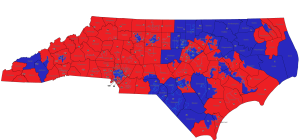The North Carolina General Assembly may soon redraw the state’s congressional districts again for 2018. But will that have an impact on elections? Todd Collins, Director of Public Policy Institute at Western Carolina University, says it depends on voter turnout.
A panel of federal judges ruled North Carolina’s congressional districts unconstitutional in February 2016, forcing the General Assembly to draw new districts. Now, those redrawn districts face scrutiny in a new court case brought by Common Cause and the North Carolina Democratic Party.

NC House of Representatives: Party Control of Districts post-2012 Election. Source: WFAE (NPR Affiliate)
The plaintiffs argue that the districts are gerrymandered along partisan lines. Historically, this has typically been the case regardless of which party has been in power to draw the lines at the time. The districts drawn in 2011 were ruled unconstitutional because of racial gerrymandering.
Collins says North Carolina currently has no competitively drawn districts.
“We have ten solidly Republican districts and three solidly Democrat districts and nothing in-between,” says Collins.
If the plaintiffs win the case and the districts are re-drawn again, they will be drawn by the state’s General Assembly again.
Collins says District 11, which covers Western North Carolina, would be particularly impacted by the change. It currently is lumped in with District 10. When districts were re-drawn in 2011, Asheville was taken out of District 11, essentially making District 11 a Republican stronghold. Before 2011, the district had consistently been competitive between Democrats and Republicans.
Collins says the upcoming election will have implications on how these districts could be redrawn, especially if the redistricting issue galvanizes voters.
“If it energizes the base of one party or another, it could actually increase turnout,” said Collins.
An independent panel of retired North Carolina justices redrew congressional districts in August to show what competitive, non-gerrymandered districts would look like. Five Republicans and five Democrats served on the panel. Neither party has an overwhelming advantage in congressional representation in the proposed map.
Collins says the chances of this map becoming the new standard for North Carolina are slim.
“We could have an independent, citizen-led board that draws the districts, but who has to agree to that? The legislature,” says Collins.


